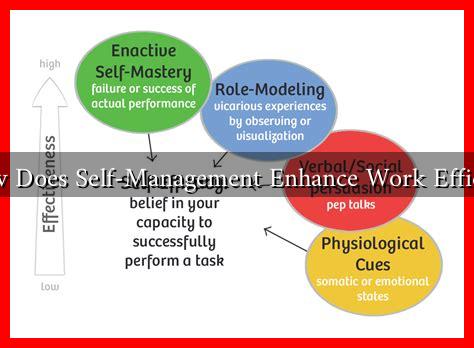-
Table of Contents
How Does Self-Management Enhance Work Efficacy?
In today’s fast-paced work environment, the ability to manage oneself effectively is more crucial than ever. Self-management refers to the process of taking responsibility for one’s own behavior, performance, and well-being. It encompasses a range of skills, including time management, emotional regulation, and goal setting. This article explores how self-management enhances work efficacy, providing insights into its benefits, techniques, and real-world applications.
The Importance of Self-Management in the Workplace
Self-management is not just a personal skill; it is a vital component of professional success. According to a study by the American Psychological Association, employees who practice self-management are more productive and experience lower levels of stress. Here are some key reasons why self-management is essential:
- Increased Productivity: Self-managed individuals are often more organized and focused, leading to higher output.
- Enhanced Decision-Making: By regulating their emotions and thoughts, self-managed employees can make better decisions under pressure.
- Improved Work-Life Balance: Effective self-management allows individuals to allocate time for both work and personal life, reducing burnout.
Key Techniques for Effective Self-Management
To harness the benefits of self-management, individuals can adopt various techniques. Here are some effective strategies:
- Goal Setting: Establishing clear, achievable goals helps individuals stay focused and motivated. The SMART criteria (Specific, Measurable, Achievable, Relevant, Time-bound) can be a useful framework.
- Time Management: Utilizing tools like calendars, to-do lists, and time-blocking can help prioritize tasks and manage time effectively.
- Emotional Regulation: Techniques such as mindfulness and stress management can help individuals maintain emotional balance, leading to better performance.
- Self-Reflection: Regularly assessing one’s performance and behaviors can provide insights for improvement and growth.
Real-World Applications and Case Studies
Numerous organizations have recognized the importance of self-management and have implemented programs to foster these skills among their employees. For instance, Google’s Project Oxygen highlighted the significance of self-management in effective leadership. The project found that managers who encouraged self-management among their teams saw a 20% increase in employee satisfaction and productivity.
Another example is the case of Zappos, an online shoe retailer known for its unique corporate culture. Zappos encourages employees to take ownership of their roles, leading to high levels of engagement and customer satisfaction. According to a report by Forbes, Zappos has maintained a customer loyalty rate of over 75%, largely attributed to its self-managed workforce.
Statistics Supporting Self-Management
Research supports the notion that self-management leads to enhanced work efficacy. A study published in the Journal of Applied Psychology found that employees with high self-management skills were 30% more productive than their peers. Additionally, a Gallup survey revealed that organizations with engaged employees—who often exhibit strong self-management skills—experience 21% higher profitability.
Conclusion: The Path to Enhanced Work Efficacy
Self-management is a powerful tool that can significantly enhance work efficacy. By adopting effective techniques such as goal setting, time management, emotional regulation, and self-reflection, individuals can improve their productivity, decision-making, and overall job satisfaction. Organizations that foster a culture of self-management not only benefit from increased employee engagement but also see tangible improvements in performance and profitability.
In a world where the demands of work are ever-increasing, investing in self-management skills is not just beneficial; it is essential for long-term success. As we move forward, embracing self-management will be key to navigating the complexities of the modern workplace.
For more insights on self-management and productivity, you can visit Mind Tools.


